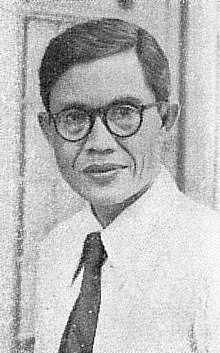Hazairin
|
Prof. Dr. Mr. Hazairin Gelar Pangeran Alamsyah Harahap |
|
|---|---|

Hazairin in 1954
|
|
| Minister of Internal Affairs of Indonesia | |
|
In office 30 July 1953 – 18 November 1954 |
|
| President | Sukarno |
| Preceded by | Mohammed Roem |
| Succeeded by | Sunarjo |
| Personal details | |
| Born |
November 28, 1906 Bukittinggi, Dutch East Indies |
| Died | December 11, 1975 (aged 69) |
| Resting place | Kalibata Heroes Cemetery |
| Citizenship | Indonesian |
| Political party | Great Indonesia Party |
| Religion | Islam |
Hazairin (born Gelar Pangeran Alamsyah Harahap on 28 November 1906 – died 11 December 1975) was the Minister of Internal Affairs of Indonesia from 30 July 1953 to 18 November 1954, serving in the First Ali Sastroamidjojo Cabinet.
Hazairin was born in Bukittinggi, West Sumatra, Dutch East Indies on 28 November 1906 to a strict religious family of Persian descent. His father, Zakaria Bahar, was a teacher from Bengkulu and his mother was of Minangkabau descent. As a child, he moved to Bengkulu to begin his schooling at a Hollands Indlandsche School, or Dutch school for Native Indonesians. After graduating in 1920, he moved to Padang to study at a Meer Uitgebreid Lager Onderwijs, graduating in 1924. During the same period, he studied Arabic and the Quran with his grandfather, expanding on his Islamic studies in his own time.
Hazairin later left for Bandung, in West Java, to study at the Algemene Middelbare School there, graduating in 1927. He then went to Batavia (modern day Jakarta) to study at the Institute of Law (Rechtkundige Hoogeschool), focusing on adat law. He graduated in 1935.
After graduation, Hazairin returned to Bengkulu under the tutelage of B. Ter Haar, a respected Dutch expert on adat, to study the Rejang people there. Using the results as the basis for his dissertation, entitled "De Redjang" ("The Rejang"), he received a doctorate on 29 May 1936. He was the only native Indonesian doctor to graduate from the Batavia Institute of Law. From 1935 until 1938 he also served as a guest lecturer at the institution.
In 1938 Hazairin obtained a post at a court in Padang Sidempuan, North Sumatra, where he stayed until the Japanese invaded the Indies in 1942; during the same period he served to enforce adat law throughout South Tapanuli. Throughout the Japanese occupation, he served as one of their legal advisers.
...
Wikipedia
